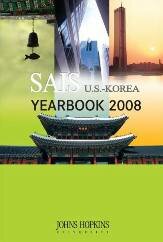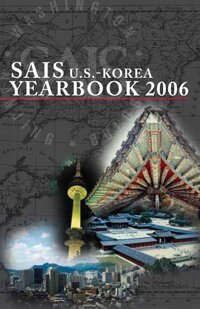On March 29, 2011, the U.S.-Korea Institute and SAIS and Center for the Study of the Presidency and Congress cohosted a seminar entitled, “Leadership Matters: The U.S.-ROK Alliance in the Lead Up to 2012.” The Honorable Lee Jae-oh, South Korea’s Minister of Special Affairs and 4 time National Assemblyman delivered the keynote speech for this event, entitled “Global Leadership: A New Vision for the U.S.-ROK Alliance,” highlighting such key issues the KORUS FTA, coordination on North Korea policy, and his vision for creating a Northeast Asian Community of Peace and Prosperity.
Stories Filed Under “Democracy”
2008 U.S.-Korea Yearbook
 The third edition of the SAIS U.S.-Korea Yearbook chronicles important developments in North and South Korea that characterized their relations with their allies and enemies in 2008. Each chapter was written by SAIS students in the course, “The Two Koreas: Contemporary Research and Record,” in the fall of 2008. Their insights were based not only on extensive reading and study, but also on numerous interviews conducted with government officials, scholars, NGO workers, academics and private sector experts in both Washington and Seoul.
The third edition of the SAIS U.S.-Korea Yearbook chronicles important developments in North and South Korea that characterized their relations with their allies and enemies in 2008. Each chapter was written by SAIS students in the course, “The Two Koreas: Contemporary Research and Record,” in the fall of 2008. Their insights were based not only on extensive reading and study, but also on numerous interviews conducted with government officials, scholars, NGO workers, academics and private sector experts in both Washington and Seoul.
The Yearbook is divided into two parts: South Korea’s Foreign Relations and North Korea’s Foreign Relations. In the first part, student authors explore the dynamic foreign policy changes that were brought about by the Lee Myung-bak administration, and how these policies affected South Korean politics both at home and abroad. In the second part, student authors explore how shifting power dynamics both in the United States, as well as among the member states of the Six-Party Talks, affected North Korea’s foreign relations in 2008. read more …
South Korea’s Presidential Elections: Growing Pains of a Young Democracy
December 20, 2007
Speakers: Charles K. Armstrong, Associate Professor of History and Director of the Center for Korean Research, Columbia University; Haeran Lim, Visiting Fellow, the Brookings Institution, and Associate Professor and Chair, Department of Political Science, Seoul National University; and Kristin Burke, Research Associate, Shorenstein Asia-Pacific Research Center (APARC), Stanford University
All three speakers agreed, in a December 20 seminar sponsored by the Asia Program and co-sponsored by the U.S.-Korea Institute at SAIS, that the main factor leading to Lee Myung Bak’s landslide victory in the December 19 South Korean presidential elections was his perceived competence in running the economy. The outgoing administration of President Roh Moo Hyun, in the minds of the South Korean electorate, had failed to heed Bill Clinton’s simple dictum, “It’s the economy, stupid.”
Charles K. Armstrong of Columbia University provided some historical context to this week’s presidential elections. It was the Great June Uprising of 1987, he declared, which brought an end to several decades of authoritarian rule in South Korea; thus, this week’s election marked the 20th anniversary of South Korea’s emergence as a truly democratic nation. Also, this year is the 10th anniversary of South Korea’s (and Asia’s) economic crisis, another event key to understanding present times.
According to Armstrong, Lee’s victory stemmed not so much from ideology as from dissatisfaction with current President Roh Moo Hyun’s performance. The South Korean electorate has clearly chosen a pragmatic approach to governance, especially in the handling of the economy. Armstrong attributed much of Roh’s decline to the collapse of the “386” generation, that is, those voters in their 30s who entered college in the 1980s, and were born in the 1960s. This generation was responsible for Roh’s winning the 2002 election. However, the members of this generation failed to hold together as a cohesive bloc in this week’s election. Armstrong declared that the successor generation to the “386” one—whose members are currently in their 20s— were a crucial factor in the December 19 elections. While the transforming moment for the “386” generation was the 1987 elections, the transforming moment for this generation was the economic crisis of 1997; therefore, this younger generation sees itself as more pragmatic and more focused on economic issues. And it voted accordingly.
Haeran Lim, visiting fellow at Brookings, and a political economist, stated that this week’s election reflected the tensions between economic and political development in South Korea. From its formulation as a country in 1945 until 1987, especially during the 1960s and afterward, South Korea experienced tremendous economic growth, but the political system was extremely authoritarian. After 1987, democracy began to evolve, and the trick was to maintain this evolution while simultaneously continuing economic growth.
Lee Myung Bak was the front-runner throughout the electoral campaign. Why was this so, asked Lim? Her answer: people were tired of both liberal rule and the incompetent leadership of Roh Moo Hyun. By contrast, Lee is perceived as being pragmatic, and with his background as an eminently successful business leader, capable of increasing economic growth rates. Lee was plagued throughout the election by charges linking him to a company that defrauded investors. An investigation is on-going. According to Lim, the voters had to weigh economic competency against “morality,” and they chose economic competency.
Lim declared that political reform must be a prerequisite for economic reform. She called the current party system in South Korea weak; parties are still dominated by personalities, and tend to rise and fall around specific political figures. Moreover, in the past, government was effective in providing economic leadership, but today, there is no vision regarding the role of government in the economy. “During the last 10 years, Korea has failed in finding a new economic development model,” stated Lim. President-elect Lee is certainly pro-business, and will almost certainly be an improvement over Roh, but it remains to be seen, concluded Lim, whether he will be able both to strengthen the political system and structurally reform the economy.
Kristin Burke of Stanford University spoke on behalf of Stanford professor Gi-Wook Shin (who had to cancel his appearance due to personal circumstances). She noted that foreign policy, especially the issues of North Korea and the United States, were not major factors in this election, as opposed to the last election of 2002. She pointed out that with legislative elections forthcoming in April (Roh Moo Hyun’s party still controls the National Assembly), South Korea will be in election mode for the next several months.
Echoing the themes already noted by both Professors Armstrong and Lim, Burke stated that Lee Myung Bak won the election based on the issue of capable economic management. She cautioned, however, that he will face several challenges right away. He must develop new policies while preparing for legislative elections in April. In addition, he will have to broker a deal with Park Kyun Hae, a major power within his own party. It is possible, asserted Burke, that if there are difficulties with Park, Lee might be tempted to form his own political party. It also seems likely that North Korea will try to test Lee. Ironically, Lee’s applying a stricter conditionality for dealing with North Korea could conflict with President Bush’s desire “to get something done” in 2008. Overall, Burke sees Lee as willing to devote more time to improving South Korean-U.S. relations, but contended that the alliance will never return to the days of the 1980s, when the United States was the overwhelmingly dominant partner.
Summary drafted by Mark Mohr, Asia Program Associate, Woodrow Wilson International Center for Scholars
2006 U.S.-Korea Yearbook
 As part of the new Korea program at SAIS, a course was also introduced for the fall semester 2006: “The Two Koreas: Contemporary Research and Record.” SAIS students researched current issues in U.S. relations with North and South Korea under the direction of David Straub, a former director of Korean affairs at the State Department. In addition to conducting numerous interviews of U.S. government officials and other experts on U.S.-Korean relations in Washington, D.C., the students traveled as a group to Seoul to receive briefings from and conduct interviews with Korean government officials, scholars, and politicians. This inaugural edition of the U.S.-Korea Yearbook, covering the chief security, economic, and cultural issues in relations between the U.S. and the two Koreas in calendar year 2006, is the product of their research.
As part of the new Korea program at SAIS, a course was also introduced for the fall semester 2006: “The Two Koreas: Contemporary Research and Record.” SAIS students researched current issues in U.S. relations with North and South Korea under the direction of David Straub, a former director of Korean affairs at the State Department. In addition to conducting numerous interviews of U.S. government officials and other experts on U.S.-Korean relations in Washington, D.C., the students traveled as a group to Seoul to receive briefings from and conduct interviews with Korean government officials, scholars, and politicians. This inaugural edition of the U.S.-Korea Yearbook, covering the chief security, economic, and cultural issues in relations between the U.S. and the two Koreas in calendar year 2006, is the product of their research.
Download the full 2006 U.S.-Korea Yearbook
All SAIS U.S.-Korea Yearbooks
